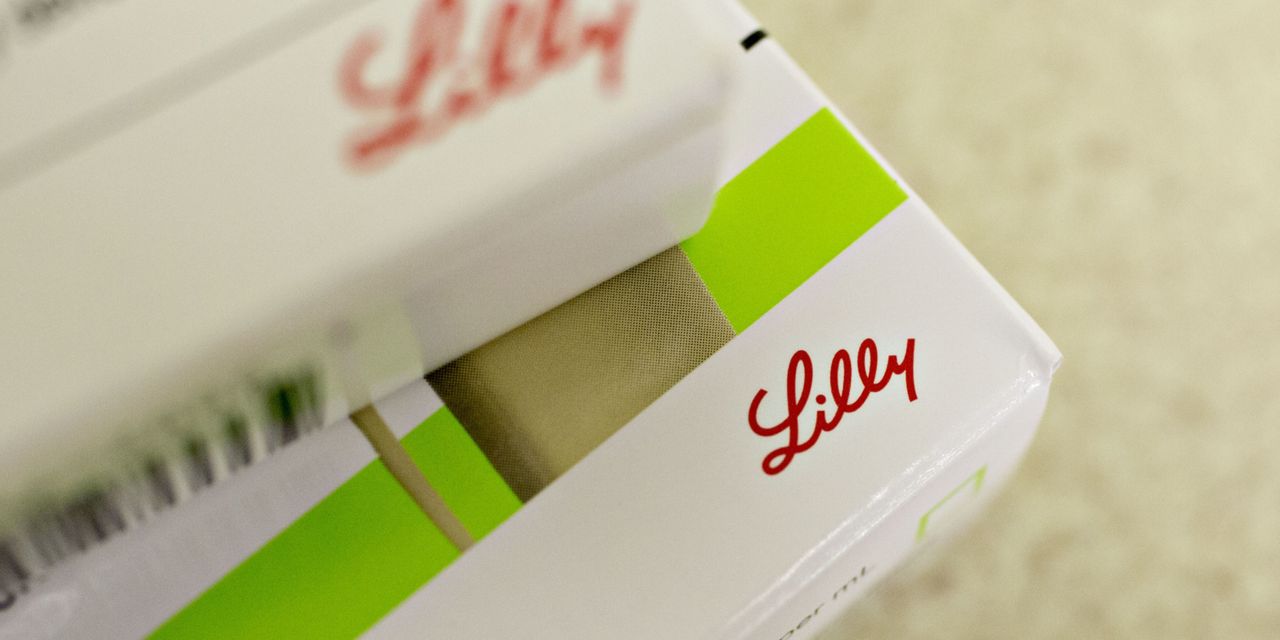Eli Lilly
said that its drug donanemab had significantly slowed the progression of Alzheimer’s disease symptoms, but that three trial participants had died after developing a condition associated with the treatment.
The results on efficacy Lilly presented were better than investors expected and seem likely to assure that the Food and Drug Administration will approve the drug. The safety data, however, leave open big questions about whether the U.S. government’s Medicare program will pay for the medicine, how eager doctors might be to prescribe it, and whether a similar treatment from
Biogen
(ticker: BIIB) and
Eisai
(ESAIY) might prove more attractive to patients.
The results mark an extraordinary moment in the decades-long struggle to find treatments for Alzheimer’s, which is estimated to affect more than 6.7 million Americans. Years of failures have ended with two surprising successes in recent months. Lilly’s (LLY) results on Wednesday come eight months after Eisai said that its drug, Leqembi, also slowed clinical decline in patients with early Alzheimer’s.
The Eisai trial was the first study to definitively prove a clinical benefit for a member of the class of Alzheimer’s drugs known as anti-amyloid antibodies, to which Leqembi and donanemab belong. It assuaged concerns that the scientific theory behind the drugs was wrong, and that pharmaceutical companies had been barking up the wrong tree for years.
Lilly’s results provide more evidence that clearing the brain buildup known as amyloid plaque can slow the worsening of Alzheimer’s in early-stage patients.
The safety concerns are significant, however. Doctors will likely have questions about what Lilly’s efficacy results will mean for real-world patients.
Lilly shares gained 4.6% in early trading, while
Biogen
shares were up 2%, after plunging shortly after Lilly’s announcement.
Lilly reported that patients on donanemab experienced a slowing of cognitive decline by 35% compared to people who received a placebo, using a measure of Alzheimer’s severity called the Integrated Alzheimer’s Disease Rating Scale. Using another measure called the Clinical Dementia Rating-Sum of Boxes, the slowing of cognitive decline was 36%.
While it is difficult to compare the results of trials due to differences in study populations, among other factors, Eisai’s trial last year showed that Leqembi slowed cognitive decline by 27%, using the CDR-SB scale. That was slightly less than the reduction achieved by donanemab.
On Wednesday morning, however, investors were focused on Lilly’s disclosure that three patients died during the trial of a condition known as ARIA, a form of brain swelling known to happen after treatment with anti-amyloid antibodies.
According to Lilly, 1.6% of patients experienced serious ARIA. Two deaths were attributed to the condition, and a third participant died after “an incident of serious ARIA.”
“We are encouraged by the potential clinical benefits that donanemab may provide, although like many effective treatments for debilitating and fatal diseases, there are associated risks that may be serious and life-threatening,” said Dr. Mark Mintun, Lilly’s group vice president of Neuroscience Research & Development, in a statement.
ARIA has been a concern with all drugs of Leqembi and donanemab’s class. Last year, Science magazine reported on three deaths linked to Leqembi in an extension of Eisai’s Phase 3 trial.
Overall incidence of ARIA appears to have been worse in the donanemab trial than in the Leqembi study. Lilly reported that 24% of treated participants developed a form of ARIA called ARIA-E; Eisai saw only 12.6% in their study. Lilly said that 31.4% of treated participants developed the other form of ARIA, called ARIA-H, while that number was 17.3% in the Leqembi trial.
“This important safety differential is enough to distinguish these two drugs with a clear Leqembi advantage,” Piper Sandler analyst Christopher Raymond wrote in a note out early Wednesday.
For Biogen and Eisai, the Lilly news isn’t at all bad. Not only does their drug look safer than Lilly’s, but Lilly’s trial does seem to prove that the science behind donanemab and Leqembi is broadly correct. That could help with Biogen’s crusade to convince the Centers for Medicare and Medicaid Services, which manages the Medicare program, to pay for Leqembi.
CMS strictly limited its coverage of anti-amyloid antiodies amid concerns about the efficacy of Aduhelm, an earlier Biogen and Eisai drug. Under the current rules, even after Leqembi and donanemab receive full FDA approval, Medicare will only pay for them for patients who are enrolled in a a registry-based study.
Biogen and Eisai are waiting for an FDA decision on full approval for Leqembi, which is now available under the accelerated approval pathway.
In an interview last week, before Lilly released the new donanemab data, Lilly’s chief scientific and medical officer, Dr. Daniel Skovronsky, said that Lilly believes that Medicare should fully cover drugs of Leqembi and donanemab’s class.
“I think it’s unethical to require elderly Americans to participate in a registry trial in order to receive a government benefit,” he said.
Lilly had filed with the FDA for full approval of donanemab based on earlier studies but received a rejection in January, which the company said was due to not enough patients having been on the drug for 12 months. Now, Lilly says it will submit the new data to the FDA this quarter.
-Callum Keown contributed to this article.
Read the full article here











